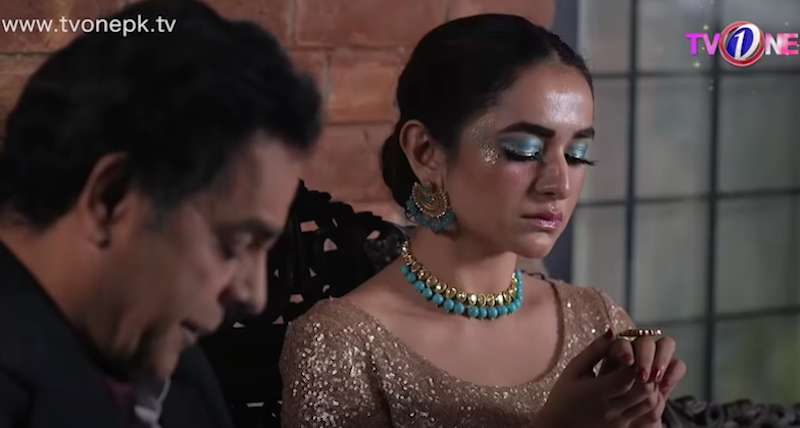Dil Na Umeed Tou Nahin opens the door to a world hidden in plain sight
Dil Naumeed tou nahin nakkam hi to hai.
Lambi hai gham ki shaam , magar shaam hi tho hai…
My heart is not unhopeful even if I have failed. Long is this night of sorrow, but it is only a night….
The title of Dil Na Umeed Tou Nahin is taken from Faiz Ahmed Faiz’s most evocative poem that reflects the pain and sorrow of captivity yet still captures the hopeful tone of this serial.
Faiz was a poet of revolution, whose words still resonate with the universal struggle for freedom, inspiring generations in the fight against oppression. The protagonists of this story are not political activists and are unaware of any grand notions of philosophy except for the most basic need to be free.
According to the Federal Investigation Agency, human trafficking is the third largest source of organised crime revenue in Pakistan, and according to statistics from the US Department of State on Pakistan provincial police reported identifying 19,954 trafficking victims in 2019, with the majority of victims recorded as women and children. The first and most essential thing these victims lose is their identity; their bodies and labour become commodities, without rights or recourse.
The drama aims to reinvest those statistics with their lost humanity and allow society to see beyond the psychological shackles that tell us such problems have no solution and can therefore be comfortably ignored.
Amna Mufti is an acclaimed writer and a veteran at addressing difficult subjects, and she hasn't failed us with Dil Na Umeed Tou Nahin. From the first episode, a wide array of diverse characters are presented to us in two parallel tracks — one set in the past and another in the present. The narrative of the past holds the seeds of the dark present leaving the audience guessing whose journey started where. The crisscrossing between timelines can be confusing despite director Kashif Nisar’s best attempts at demarcation with time and location stamps. While this approach might take some of the focus away in terms of clarity, it does add a sense of anticipation and tension that a more linear narrative might not have given.
The hidden fragilities of rural and urban poverty, always one financial crisis away from disaster, are illustrated within each family shown on our screens. There is Allah Rakhi, the youngest daughter in a family of potters and her father's favourite, who made a miraculous recovery and was brought back from the graveyard she would have been buried in. Her eldest sister’s marriage is her downfall. After the groom's side demands a motorcycle and more as dowry, Allah Rakhi’s father goes against his better judgement and borrows from a local loanshark, who puts the family’s donkey down as collateral but her eyes are assessing Allah Rakhi.

Then there is Allah Rakhi’s friend and neighbour Jamshed, whose father has disappeared, leaving him with his bitter, angry stepmother. A woman drowning in poverty and struggling to survive, his stepmother takes out all her frustrations on the innocent child under her absolute power. Despite the near constant physical and emotional abuse at home and school, the innocent Jamshed still nurtures enough affection for his stepmother to be lured into leaving home by the prospect of earning enough money to make her happy.
This track shows us the effects of violence on both the psyche and bodies of children that are too often considered acceptable in Pakistani society. The recent passing of a law by the National Assembly (and pushed by musician Shehzad Roy’s Zindagi Trust) that prohibits all forms of corporal punishment in Islamabad has been hailed as a historic step in protecting the rights of the children of Pakistan. However, as with every law, legal framework can only be a remedy if it is reinforced with action and by promoting a culture that discourages violence.
Jamshed’s escape to Lahore does not last long, as he falls into the clutches of criminal gang of professional beggars and thieves. Will Jamshed become Jimmy, the suave avatar we see of Wahaj Ali in the dramas promotions, or someone else? By episode six this is still a mystery.
The third track is about Zehra Naseem, a girl from a more settled family who lives in an urban setting. Zehra is a good student and a great cricket player but her innocent street games attract the attention of her father’s lascivious boss Naeem Sherwani, who starts fulminating about modesty. Zehra’s father is a good man but easily led, and it never occurs to him to stand up for his daughter’s right to an education. The writer quietly highlights the consequences of the myth that women bear the sole responsibility for their own safety and public morality, while men are helpless creatures, unable to control themselves.
Popular dramas such as Mere Paas Tum Ho and the former Lahore CCPO blaming the victim of the motorway rape case for taking the wrong road are testament to the pervasiveness of this belief.
Those that can afford the luxury of education in seclusion may do so, but in practical terms the burden of such “modesty” falls on girls from poorer families whose choices, education and financial independence are already limited. This ultimately serves the interests of predators, increasing the girl’s vulnerability by firstly by making them more of a burden on their families and secondly by reducing their capacity for self-reliance.

In the present day track we see Sumbul (Yumna Zaidi), whose will to escape a life of prostitution is building after watching her friend Ramsha tortured and murdered by a psychopathic client. Sumbul is young, beautiful and intelligent, which makes her a very valuable asset to Aunty Ji (Navid Shehzad), the madam who manages the brothel on behalf of a powerful secretive man.
Omair Rana as Zulfi Saheb helps keep the “business” running smoothly, while Adnan Shah Tipu acts as the brutish enforcer, charged with beating the girls if anyone steps out of line. Yasra Rizvi is Savera, Sumbul’s friend, who thinks she is wise by accepting her situation and tries to live in the moment without looking to the past or future.
An accomplished cast combined with Mufti’s well written plot has lifted this drama well above its simple production values and lack of lighting. The air of melancholy may well be necessary to show the seriousness of Sumbul and Savera’s plight but reduces the mass appeal of this drama whose primary purpose is to reach as many people as possible. Showing on TVONE and PTV Home, Dil Na Umeed Tou Nahin has amassed a dedicated following on YouTube too, especially from international viewers who look for more than just entertainment.
Quality content and popular stars with reputations for excellence have also raised its presence on social media, allowing public conversation on the issues it raises to grow further.
As I write this review, there are three other dramas on air that give us portraits of women in Sumbul and Savera’s positions, but they follow the usual airbrushed myth of the beautiful courtesan that the general public can stomach. Zohra of Raqse Bismil is the “untouched” escort, who goes to college and refuses the hero's attempts to marry her, while Nargis has been saved by a nikkah to an older man.
Qayamat gives us a more conniving, villainous viewpoint, with the more empowered Pari ji who is under no one’s thumb and is an expert at manipulating foolish men. The soft lens through which we view these other three characters reflects the old courtesan traditions of the famously cultured Tawaifs of medieval Hindustan, who were eventually reduced to mere prostitutes by the British who saw their gatherings or mehfils as seditious and immoral.

Such romantic figures may have had choices but the harsh reality is that women trapped by traffickers have no choices. Sumbul’s face is hidden behind a mask of garish makeup and her clothes designed to signal her availability to showing us the difference between a palatable fantasy and harsh reality. Yumna Zaidi and Yasra Rizvi give us finely nuanced portrayals of women who survive the worst of conditions through love and friendship. Omair Rana as the smooth-talking go between Zulfi is a fascinating enigma: kind but manipulative, controlling but somehow, strangely supportive of Sumbul’s new assertiveness. Navid Shezad’s Aunty Ji is another fantastic portrayal, sometimes amusing in her hypocrisy and greed but never far from hard edged cruelty.
However, the greatest accolades must be showered on the talented child actors who have brought the naivety and sweetness of their roles so accurately to the small screen under the expert guidance of director Nisar. Following the success of dramas like Akhri Station, Rehaii and Udaari, the Kashf Foundation (an NGO dedicated to women empowerment) has produced this drama in conjunction with UN Women and the National Commission for the Status of Women.
The Kashf Foundation's goals for this serial are “to effectively address the need to understand and educate society on what is human trafficking, its various forms, which includes sex trafficking, bonded labour, domestic servitude, and which can be termed as modern-day slavery".
Although the entire team of Dil Na Umeed Tou Nahin have gone to great lengths to avoid showing anything that might remotely be described as inappropriate for Pakistani screens, enough complaints have been made by various offended parties to trigger a notice from PEMRA , which has asked the makers to abide by the content guidelines set for the Pakistani media. This is not the first time PEMRA has issued a notice to stories highlighting social evils, the serial Udaari (which focused on child abuse) was also served a notice when it first aired. Recently more commercial stories like Mere Paas Tum Ho and Jalan have also faced warnings, though these serials were allowed to run.

Human trafficking, adultery and abuse are common to all societies, be it Pakistan, India or the US, and these problems will not disappear if they are ignored, in fact they will fester and rot the very roots of the “decent” society those complaining to the censors hope to maintain. Illustrating and identifying an issue (within cultural boundaries) is essential for both prevention and a cure — it cannot be held hostage to a small, but vocal group’s sensitivities.
PEMRA needs better, more finely tuned mechanisms to be both responsive to the needs of creators and the viewing public. The one plus point in this outcry might be the irony that in each case, the notice from PEMRA gave the dramas a rating boost.
Dil Na Umeed Tou Nahin has opened the door to a world that remains hidden in plain sight. Hopefully the light that shines through will help us all cut off the supply lines to these trades and learn how to empower victims so they find release.













Comments